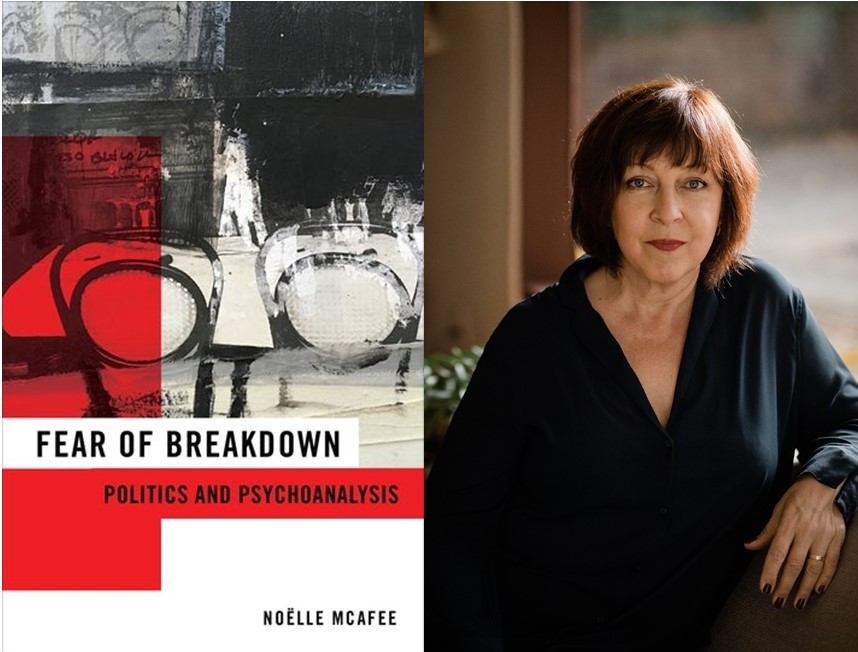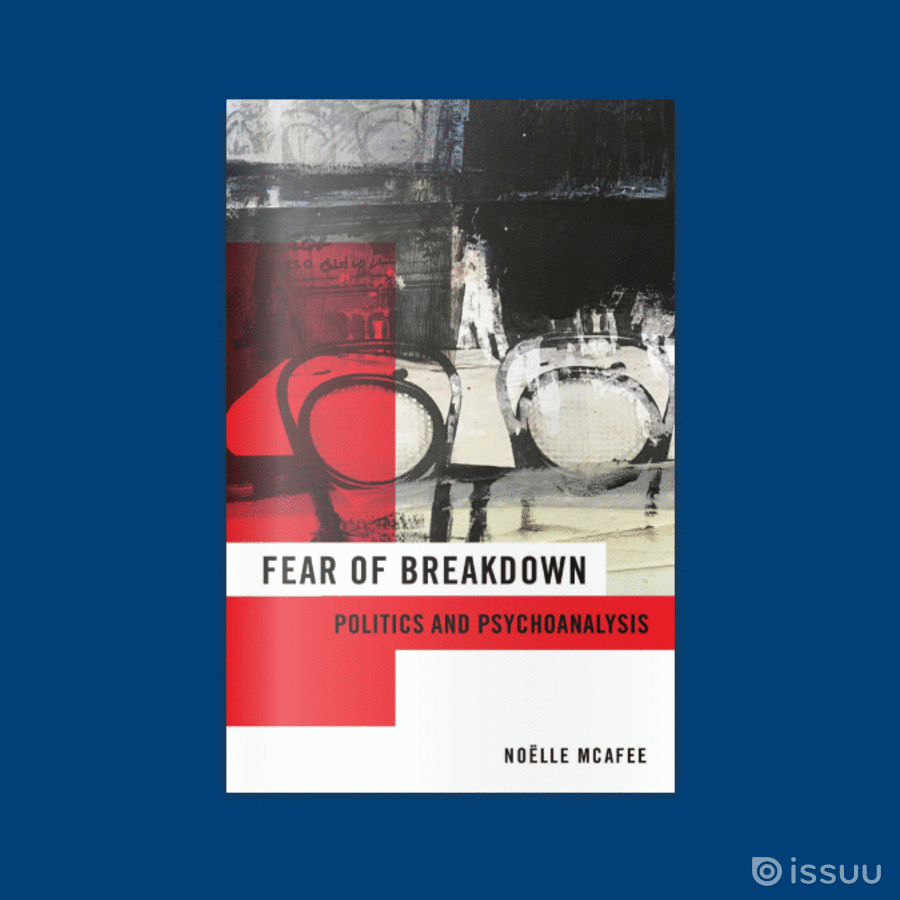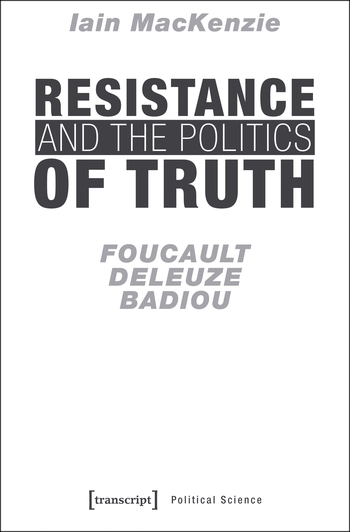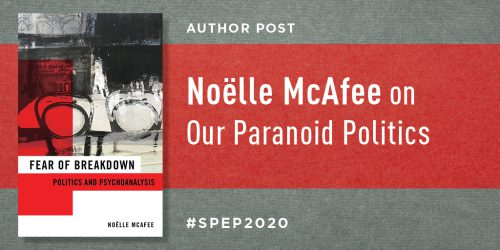Six Empowering Steps Towards Political Discourse
By Noëlle McAfee

“In exploring the fear of breakdown that underlies human existence, Noëlle McAfee creates a genuine intellectual breakthrough—her book is a stunningly original exploration of the political significance of mourning. This is one of the most thrilling books I have read in years.”
~Mari Ruti, author of Penis Envy and Other Bad Feelings: The Emotional Costs of Everyday Life
Divisiveness reigns over our politics today, and as partisanship continues to rise, the sense of uneasiness does too. But what can be done to abandon the current Manichean views of politics. In this post, author Noëlle McAfee draws on her book Fear of Breakdown: Politics and Psychoanalysis to discuss 6 steps we can take towards achieving respectful political discourse.
• • • • • •
Our current age of anxiety produces its own anxious politics. With fires raging in Australia after a season of fires raging in California, with a U.S. president having the temperament of a toddler and being impeached, with assassinations and bombings and Brexit and the growing gap between the ultra-wealthy and everyone else, it’s natural to think that everything is falling apart and that there is little hope. Unlike the age of anxiety that W. H. Auden wrote of in 1947, where the anxiety was about keeping ourselves under control, this one seems to be about protecting ourselves from external destruction.
That earlier midcentury age of anxiety led in the 1960s to a politics of liberation. This one is leading to a politics of polarization, of splitting, of Manichaean thinking. The Other is not just my adversary; now he is my enemy. Where the liberatory politics of the 1960s helped to undo the anxieties of the previous decades, our current paranoid politics just makes matters worse.
“Paranoia permeates the Right and the Left: we are in the throes of a paranoid-schizoid politics.”
Paranoia permeates the Right and the Left: we are in the throes of a paranoid-schizoid politics. “Paranoid-schizoid” is what the Viennese psychoanalyst Melanie Klein called the tendency of small children to divide the world into angels and demons, saviors and destroyers, forces of light and forces of darkness. Where Klein saw the paranoid-schizoid position as rooted in the immaturity and defensive omnipotence of individuals, we can look around and see it at work in whole swaths of people. Today’s paranoid-schizoid politics resounds in the Twitter feed of Donald Trump and all its retweets. Out of anxiety that America might not be much of anything at all, it mounts paranoid defenses, calling for making America great by destroying anyone or anything that threatens its purity and wholeness.
There are unconscious processes at work. The Other becomes the reservoir for thoughts and anxieties that are too unbearable to tolerate, so these feelings are split off and put in the Other: We aren’t dangerous; they are. We aren’t weak; they are destroying us. We love America and freedom and goodness; they hate it. This splitting contributes to polarization, to seeing only the worst in the Other, who is seen as evil and unredeemable whereas our own side is unassailable and good. All over our politics today, on the Left as well as the Right, there is this kind of demonizing and idealizing.
In our paranoid-schizoid politics, rarely does either side admit to its own shortcomings or acknowledge any of the other side’s strengths. The Left doesn’t own up to its elitism (evidenced in its tendency to dismiss its opponents as uneducated, stupid, or ignorant), nor does the Right own up to the fact that even if all conservatives aren’t racists, most white supremacists are conservative. The Left never praises conservatives for their commitments to community and loyalty, values that can actually be pretty decent even if sometimes put to terrible use. The Right never praises liberals for their concern for the social welfare of the poor. The Right values individual responsibility, and the Left, social responsibility. But neither will give any quarter to the other.
“In our paranoid-schizoid politics, rarely does either side admit to its own shortcomings or acknowledge any of the other side’s strengths.”
What we need, to borrow again from Melanie Klein, is a politics that can deal with imperfection, loss, and ambiguity. Klein called this kind of a mindset the depressive position not because it is melancholic but, to the contrary, because it is a position that tarries with and works through loss as it emerges from a paranoid-schizoid position. Developmentally, out of persecutory anxiety, the child may dream of murdering and destroying the fantasized demons, but if all goes well, as it starts to grow up, it will begin to realize that others are neither angels nor demons but whole, complex, and flawed people. Likewise, I suggest that in these anxious times, we need to come out of our paranoid politics by realizing that political choices are rarely between forces of light and forces of darkness but instead are difficult, fraught choices that always entail some loss.
So toward this I offer at the beginning of this new decade six practices drawn from my book, Fear of Breakdown, that might help us work through rather than double down on our anxieties:
- Instead of seeing politics as a battle between good and evil that plays out in halls of governance, start seeing it as a public practice that each of us engages in whenever we are thinking and talking with others about what kind of communities we want to create.
- Rather than seeing ourselves as victims of a broken or corrupt or nefarious system, see ourselves as political agents who can make a difference, people who can call a meeting, who can help constitute our political institutions and policies.
- As opposed to thinking that policy makers decide what policies need to be addressed, remember that it has always been public and social movements that have put matters on the public agenda and that you and your neighbors, colleagues, and friends can work together to publicly identify what needs to be addressed and can help raise consciousness about the issues.
- Instead of treating policy debates as stark choices between what is perfect and what is terrible, start exploring how all choices involve some loss. There is no perfect solution. Any direction will have costs. So, as you engage in conversation with others about what ought to be done, take seriously the imperfections and cost of any possible solution, and choose with a mind toward being willing to pay the price for what we want.
- Instead of waiting for public officials to do something, take whatever public will emerges from these practices and try to harness it for change. Often, we are the ones we’ve been waiting for.
- And finally, do not become complacent and settled in your convictions. Continue to learn from the past, question radically, and judge anew.
This way of approaching politics calls for a change in our attitudes both to problems and to one another. Where a politics bent on avoiding destruction splits the world into good and evil, a politics of working through anxieties calls for seeing shades of gray, nuances, and ambiguities. It means being a little more grown-up.
Explore more books from the New Directions in Critical Theory series, and save 30% when you order from our website by using coupon code: CUP30 at checkout.








